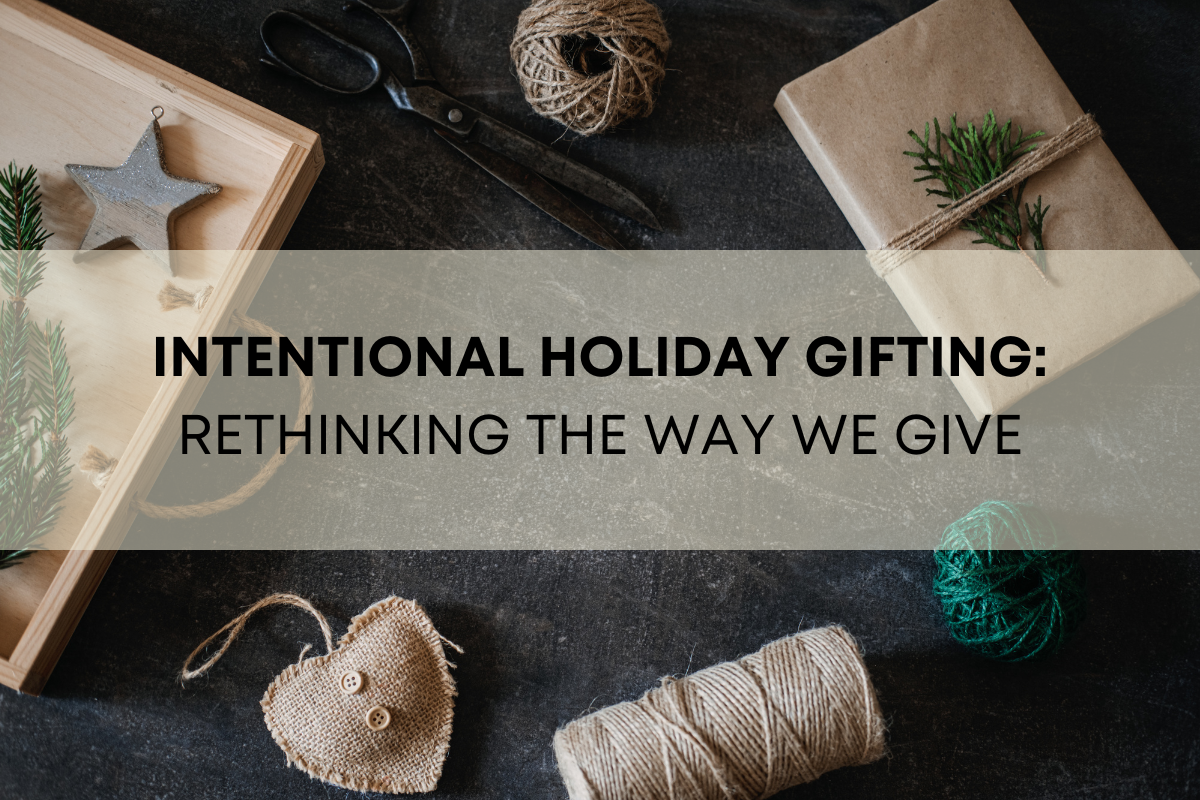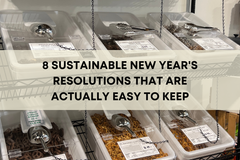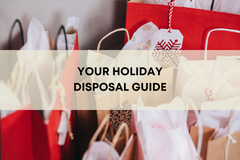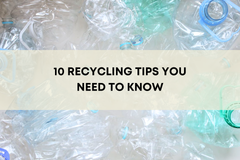Intentional Holiday Gifting: Rethinking the Way We Give

The Benefits of Intentional Gifting
By shifting to intentional gifting, you not only reduce environmental impact but also help create a more fulfilling holiday experience for your loved ones. Thoughtful gifts are often more cherished and less likely to end up in the back of the closet, tossed, or returned. Supporting local businesses and secondhand markets helps strengthen communities by keeping your money in the local economy, and experiential gifts can build stronger personal connections.
Part of living a sustainable lifestyle as well is to minimize your environmental impact. In a world of overconsumption as the expectation, it’s easy to get caught up in buying because of a “want” and not for a “need.” Intentional gift giving aligns with a growing desire for sustainability.
A recent study found that 77% of consumers who value sustainability are willing to change their shopping habits to reduce their environmental impact (1). By adopting these practices, you join a movement toward a more mindful and eco-conscious future.

The Spooky Truth About Holiday Gift Returns
The holiday season is synonymous with generosity and joy, but it often brings unintended consequences: overconsumption, waste, and environmental harm. From unwanted gifts to excessive packaging, the environmental footprint of the holidays is staggering. Overconsumption has become a norm in American shopping culture with the ease of online shopping and convenience of shipping. But holiday returns are increasing every single year with the majority of returns made due to the item arriving late, or it was an unwanted gift (2).
It’s estimated that over 30% of gifts are returned each year, and what’s even scarier is that 80% of these returned items end up in landfills, contributing to 5.8 billion pounds of waste and 16 million metric tons of greenhouse gas emissions from the shipping process each year (3).
These trends highlight the urgent need to rethink how we give and to embrace intentional, sustainable gifting for our friends, family and loved ones. Sometimes we keep doing the same thing just because it is what we have always done, but it’s not too late to change it up.

The Cost of Traditional Holiday Gifting
The environmental toll of holiday traditions extends beyond returns. Americans produce 25% more waste during the holiday season, generating an additional 1 million tons of garbage per week between Thanksgiving and New Year’s (4). This waste includes packaging, decorations, and discarded gifts. For instance, nearly $9 billion worth of unwanted holiday gifts go unused or are thrown away annually. Fast shipping and mass production of goods exacerbate the problem, leading to carbon emissions and resource depletion.
Unintentional gifting—buying simply to fulfill societal expectations or retail promotions—plays a significant role in these outcomes. The Black Friday - Cyber Monday weekend has become an unhealthy practice of online buying, with retailers offering big competitive discounts to fuel buying and gifting for the holidays. It leads to items being undervalued, underused, or quickly discarded. This not only creates waste but also undermines the true spirit of giving: connection, thoughtfulness, and care.
What Is Intentional Gifting?
Intentional gifting is about choosing gifts with purpose and mindfulness. It’s a way to honor the recipient while reducing waste and promoting sustainability. Instead of defaulting to material possessions, intentional gifting encourages alternatives that bring joy without contributing to the holiday waste crisis. Here are some approaches to consider:
Shop Local and Support Small Businesses
Shopping with local businesses helps to reduce the environmental impact of shipping and packaging. Shopping in-person is an incredible way to support a small local business, helping you explore your neighborhood as well as see and feel the product in person. It also supports community economies and fosters meaningful connections. Your purchase goes a long way to support local makers and entrepreneurs who reinvest in the community.
Shopping locally is one of the most impactful ways to practice intentional gifting. While prices at small businesses may sometimes be higher than big-box stores, they reflect the quality, craftsmanship, and care that go into their products. Small businesses often produce items in small batches, ensuring higher quality and a unique touch. For Tare Market, all of our products are handmade and locally sourced, supporting fair wages and ethical production practices.
When you choose to shop small, you’re not just buying a gift—you’re contributing to a thriving, ethical, and sustainable local economy.
Opt for Experiences Over Things
Experiential gifts create lasting memories without adding to clutter. Consider experiences like:
- A concert, movie or show
- A cooking, pottery, or painting class
- A gift card for your favorite restaurant
- A gift card for a service such as a facial, massage, or even to get their nails done!
- A trip to your favorite place or somewhere they’ve always wanted to go
Research shows that experiences tend to bring more happiness and connection than material items, offering recipients something they’ll treasure long after the holidays (5).

Explore Secondhand Options
Vintage or secondhand gifts can be incredibly thoughtful and eco-friendly. From gently used books to unique home décor, secondhand shopping helps extend the lifecycle of items while reducing the demand for new production. It’s a great way to find one-of-a-kind treasures that carry their own charm and story.
If your friend or family member has an item on their list, why not search it on Facebook Marketplace, eBay, or a local buy group first? You may get lucky and find that someone is selling a brand new version of your exact item.
DIY and Handmade Gifts
DIY and handmade gifts are a wonderful way to express thoughtfulness while minimizing environmental impact. Creating something yourself adds a personal touch, showing the recipient that you put time and care into their gift. These gifts often require fewer resources to produce and avoid the excessive packaging typical of store-bought items. Here are just a few examples of DIY gifts you can make!
- Homemade Edibles: Bake a batch of cookies, craft a jar of granola, or make infused olive oils or vinegars. Package them in reusable glass jars or decorative tins for an extra touch.
- Knitted or Crocheted Items: If you’re crafty, consider knitting scarves, hats, or mittens, or even a sweater! These cozy gifts are practical and heartfelt, especially during the winter season, and bound to be put to use!
- Photo Albums or Scrapbooks: Compile meaningful photos into a personalized album. As printed photos and polaroids become popular again, this is a great way to continue to capture your relationship(s) and create an experience scrapbooking those memories together.
By gifting something handmade, you’re not only reducing your environmental footprint but also offering something with intrinsic value that no store-bought item can replicate.
Ask for a List
If buying lots of gifts is a must, or a big family tradition that you’d like to uphold, start asking for exact lists of what they want — this helps eliminate the guesswork and the potential of buying something that isn’t their style, what they didn’t want, or not what they envisioned. By having your loved ones compile lists with images or links, you can give more intentionally by buying exactly what they want, reducing the chances of a return or the item going to the landfill.
Intentional Shopping, Intentional Gifting
This year, we hope you’ll consider shopping local (with us) and others in your community, and go beyond the cycle of overconsumption in the holidays. Whether it’s shopping small, going secondhand, or creating memorable experiences, every choice makes a difference, not only for our relationships, but for the environment.
At Tare Market, we carry over 700 zero waste and plastic-free products from small businesses and makers from all over the U.S. These products are made by women-, queer-, BIPOC-owned businesses who are all supporting the zero waste movement, and creating products that are not only natural (and healthy for us humans) but safer for the environment.
Thank you for supporting our small business and joining in on the zero-waste lifestyle!
Sources:
- https://www.retailtouchpoints.com/topics/digital-commerce/how-returns-drag-down-sustainability-efforts-and-what-retailers-can-do-about-it
- https://www.keteres.com/resource/unwrapping-the-surprising-spike-in-holiday-waste
- https://www.thesimplicityhabit.com/statistics-on-wasteful-holiday-spending/
- https://www.giftster.com/news/environmental-impact-of-holiday-gift-returns/
- https://www.sciencedaily.com/releases/2004/12/041219182811.htm#:~:text=According%20to%20Van%20Boven%2C%20experiences,more%20to%20successful%20social%20relationships
Recent Blog Posts
Discover more tips on living #ZeroWaste!
-

8 Sustainable New Year's Resolutions That Are Actually Easy To Keep
Sustainable New Year’s resolutions don’t have to be overwhelming. These 8 simple, realistic habits make it easier to reduce waste, shop more intentionally, and build low-waste r...
Read more -

Your Holiday Disposal Guide
The holidays can generate a lot of extra waste, but much of it doesn’t need to end up in the landfill. This holiday disposal guide breaks down what can be recycled, composted, r...
Read more -

10 Recycling Tips You Need To Know
Recycling can be simple, but small mistakes can contaminate your recyclables and reduce their impact. In this guide, we share 10 practical tips to help you recycle smarter, from...
Read more



